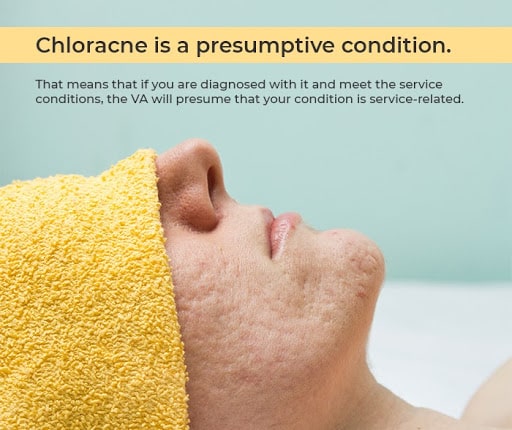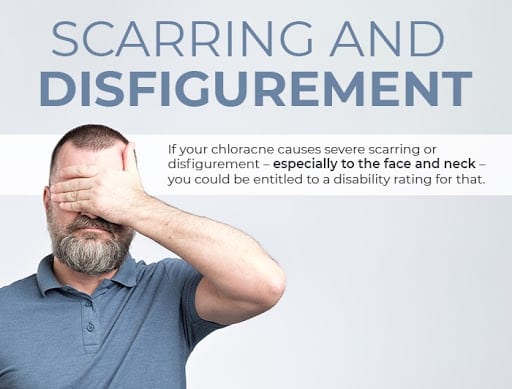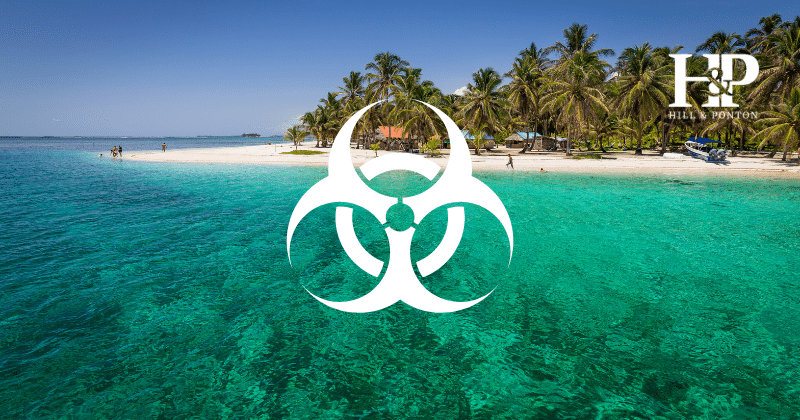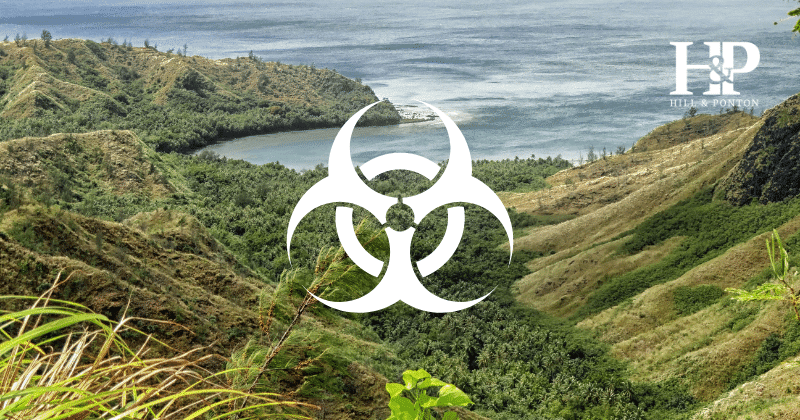What is chloracne?
Chloracne is an inflammatory skin disease closely associated with exposure to the Agent Orange defoliant used in Vietnam or along the DMZ in Korea in the 1960s and 70s. The disorder characterized by outbreaks of blackheads, pustules, skin lesions, and cysts — especially around the eyes, behind the ears, armpits, and groin areas.
More generally, chloracne is usually caused by exposure to halogen aromatic hydrocarbons called dioxins one of which was a chemical associated with Agent Orange.
Despite the name, chloracne is not related to the acne we usually associate with adolescents. The correct, more formal name for the condition is “MADISH”— Metabolising Acquired Dioxin-Induced Skin Hamartomas.
What is dioxin?
Dioxins are toxic chemical compounds that were once common in insecticides and defoliants, including Agent Orange. There are several hundred varieties of dioxin, about 30 of which are known to be harmful to humans.

Dioxins are not common in end products. Environmental regulators have significantly reduced their use. But dioxins are still common byproducts of chemical reactions and processes. They are also common in backyard burns.
Dioxins are very persistent. They can remain in the environment and in human tissue for years.[i] [ii]
The dioxin-derivative specifically associated with to Agent Orange is 2,3,7,8-tetrachlorodibenzo-p-dioxin (TCDD), which is one of the more toxic dioxin-like substances known. TCCD was not a deliberate additive to Agent Orange. Properly manufactured, Agent Orange was supposed to consist of an equal part of two common herbicides, 2,4,5-Trichlorophenoxyacetic acid (2,4,5, T) and 2,4-Dichlorophenoxyacetic acid, (2,4-D).
Monsanto, the Agent Orange manufacturer, claims they did not intend to include TCDD in Agent Orange. It was likely a byproduct produced accidentally in some batches due to overheating.
A high level of exposure over a short period of time, such as that incurred by U.S. military veterans in Vietnam, is known to cause chloracne among other conditions recognized by the VA.
Symptoms of Chloracne
Mild cases
- Extremely oily skin;
- Blackheads, comedones, papules, pustules, and fluid-filled cysts, usually around eyes, ears, cheekbones, and temples;
- Dark hair growth;
- Flaking or peeling skin.
- Sweaty palms and soles (hyperhidrosis)
- Pigmentation, increased hair growth and blistering (porphyria cutanea tarda)
Severe Cases
- More widespread acneiform and blackheads over the face, behind the ears and on arms;
- Permanent scarring.
Extremely high doses of dioxin exposure can result in more significant long-term health problems, including:
- Early and sudden gastrointestinal illnesses
- Pancreatitis
- Liver dysfunction
- Neuropathy
Long-term health effects of Agent Orange dioxin exposure
According to the World Health Organization, dioxin exposure is linked to several long-term health problems to various organ systems:
- Hormonal interference
- Cancer promotion
- Immune system damage
- Reproductive problems
- Birth defects
Treatment of Chloracne
Chloracne and chloracne lesions are stubbornly resistant to treatment. Dermatologists sometimes treat chloracne with oral antibiotics or isotretinoin. Larger cysts and pustules may be lanced and cauterized.
Can You Get VA Benefits for Chloracne?
Chloracne is closely associated with exposure to the Agent Orange defoliant in the Vietnam War and along the DMZ in Korea. So much so that the VA presumes any documented chloracne cases within one year of exposure are service-related. It’s one of two skin conditions (the other being porphyria cutanea tarda) that the VA considers presumptively service-connected if you’ve been exposed to Agent Orange while in the military.
Click here for a free, no-obligation evaluation of your case!
How do I qualify for benefits?
Chloracne is a presumptive condition. That means that if you are diagnosed with it and meet the service conditions, the VA will presume that your condition is service-related, in accordance with the Agent Orange Act of 1991.
Your chloracne diagnosis (or diagnosis of similar acneform disease) may qualify you for VA disability if you meet any of the following criteria:
- You came into contact with Agent Orange while serving in the military, or;
- Served in or near the DMZ for any length of time between September 1, 1967, and August 31, 1971, or;
- You served in the Republic of Vietnam for any length of time between January 9, 1962, and May 7, 1975. This may include serving aboard a vessel on the inland waterways, or on a vessel operating not more than 12 nautical miles seaward from the demarcation line of the waters of Vietnam and Cambodia.[iii]
You must also show that your symptoms began within a year of exposure and that it was at least ten percent disabling, according to the VA criteria below:
Chloracne and Disability Compensation Ratings
VA officials will assign your chloracne disability percentage rating under 38 CFR § 4.118, Schedule of ratings – Skin.
Typically, your chloracne is merely superficial, affecting just one layer of skin, you may not receive a VA disability rating.
If the chloracne is deep and severe (resulting in pustules and cysts), and affects less than 40% of the face and neck, or if it affects other areas of the body (other than those listed immediately below), you may receive a disability rating of 10% from the VA.
If the chloracne is deep and severe and spreads to affect your armpit(s), genital area, folds of breasts, or the crevices between toes and fingers, you may receive a disability rating of 20%.
If the chloracne is deep and severe and affects at least 40% of the face and neck or more, you would receive a disability rating of 30%.
Scarring and Disfigurement
If your chloracne or other service-related skin disorder causes severe scarring or disfigurement – especially to the face and neck – you could be entitled to a disability rating for that. Facial disfigurements with visible or palpable tissue loss and/or severe asymmetry in at least three features could qualify for a disability rating as high as 80%, though this would be rare in chloracne cases.
In some cases where the chloracne is severe enough to cause severe scarring and disfigurement, the VA could assign you a disability percentage for scarring.
How much disability can I collect?
VA benefits are based on the percentage disability the Veterans Administration assigns you. Except for 10% and 20% disability ratings, the amount you can collect is also based on your marital status and size of your family.
You can calculate your ratings using our VA disability calculator!
You may also qualify for spousal aid and attendance benefits.
Appealing a chloracne-related VA disability claim
If you meet the government’s criteria for service-related chloracne disability, you should be assigned the appropriate disability rating, and if the proper disability percentage rating is above zero, you should collect benefits.
In some cases, the VA improperly denies benefits. If you feel you were wrongly denied disability benefits or your disability percentage was unjustly low, you can appeal. VA processes are complicated, even for those with many years of experience dealing with federal bureaucracies. Successful applications and appeals can hinge on seemingly minor details.
Having an experienced attorney who specializes in VA disability ratings can be instrumental in getting your initial claim or appeal approved. An attorney can also help you maximize your eventual benefit. In many cases, a qualified attorney can even help get you the retroactive benefits you are entitled to under the law.
For a free, no-obligation assessment of your case, click here, or call 1-888-373-9436.
This article is for general information and educational purposes only, and does not create or imply an attorney/client relationship.
[i] https://www.medicalnewstoday.com/articles/17685#sources
[ii] Moses M, Lilis R, Crow KD, et al. (1984). “Health status of workers with past exposure to 2,3,7,8-tetrachlorodibenzo-p-dioxin in the manufacture of 2,4,5-trichlorophenoxyacetic acid: comparison of findings with and without chloracne”. Am. J. Ind. Med. 5 (3): 161–82. doi:10.1002/ajim.4700050303. PMID 6142642.
[iii] C.f. Public Law 116-23, the Blue Water Navy Vietnam Veterans Act of 2019.








